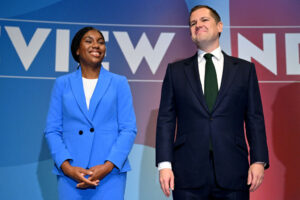Rishi Sunak is creeping out of the Tory leadership like a mouse walking past a sleeping cat. This is a shame because his departure is significant, marking the end of a political era that began in the Eighties. Sunak’s hero is the former chancellor Nigel Lawson, who served under Thatcher from 1983 to 1989. At first glance, this seems odd. Lawson was more flamboyant than Sunak. He was also, in formal terms, less successful. Sunak has been and gone as prime minister at the age of 44. Lawson entered Parliament for the first time in his early forties and did not get into the Cabinet until he was almost 50.
In some ways, the relatively slow pace of Lawson’s political career is itself the point. Lawson was chancellor during the deregulation of the City of London in the “Big Bang” of 1986 and it was he, in 1988, who introduced a top rate of income tax of 40% — lower than it had been for many years before and lower than it is now. In short, Lawson achieved more without being prime minister than any recent prime minister achieved during their time in Downing Street. Lawson, in fact, was a rare example of a British politician who had the sense to recognise that his great gifts did not necessarily make him prime minister material. He was never a candidate for the leadership of his party.
One of the problems created by the febrile state of Conservative Party politics in the years since 2016 is that any Tory MP thinks he or she could be prime minister. Shortly after losing his parliamentary seat, Steve Baker gave an interview to Spectator TV in which he seemed to suggest that having read Dale Carnegie’s How to Win Friends and Influence People gave him a unique insight into ”leadership”, equipping him to lead his party and his country. Sunak is the last survivor of an age when senior Tory politicians were expected to be substantial and able people. As well as Lawson, the Thatcher Cabinet contained, at various times, Michael Heseltine, Douglas Hurd, Ken Clarke, Cecil Parkinson and Norman Tebbit, all of whom achieved important things in their ministerial positions. All were people who might plausibly have been prime minster, or else have had a successful career out of Parliament. Heseltine, for one, had made a fortune in business. When he resigned from the Cabinet, he took his ministerial driver onto his own payroll — probably offering him more money and a flashier car to drive.
Like Heseltine, Sunak had a successful career in business before he went into politics. His enemies sometimes say that he was well qualified for any position other than prime minister, but the alarming thing about his two potential successors is that they seem unqualified for all jobs as well as that of prime minister. If you were interviewing for a post in middle management and the recruitment agency sent you the CVs for Robert Jenrick and Kemi Badenoch, you would ask for your money back. Many of the most able Conservatives — Dominic Grieve or David Gauke — were driven out of the party by Boris Johnson, and I suspect that some Conservative MPs are beginning to feel uncomfortably like those Red Army soldiers in June 1941 who had to go into battle after Stalin had shot their best generals.
The second respect in which Sunak’s departure marks the end of an era relates to the politics of conviction. Sunak’s enemies portray him as a mere technocrat. They imply that he would be happier in the later stages of Ted Heath’s administration than in the government of Margaret Thatcher. This is an absurd misunderstanding. Having convictions, and being willing to act on them, is not the same as making statements about the importance of convictions. On the whole, the language of the Thatcher government was remarkably moderate. It had a small number of central principles and was usually pragmatic about the means by which it implemented them. Thatcher’s ministers did not, for example, say in public that they wished to crush the National Union of Mineworkers; they probably did not even say it in private until they had decided that there was no other means to get what they wanted. Compare this to the public war dances of senior Tories as they declare their willingness to fight some inoffensive institution — the Office for Budget Responsibility or European Convention on Human Rights — to which leader writers on the Daily Mail have taken a dislike.
Sunak talked soft but did more to implement the policies of the current Tory Right than any other front bencher. He voted for Brexit in 2016. As chancellor, he seems to have argued against lockdown more than any other minister and to have done the most to ease its impact. As prime minister, he did not even pay lip service to environmental policies — incidentally, this last stance would have pleased Lawson but exasperated Thatcher.
The contrast between Sunak and Liz Truss is particularly marked. Sunak is the urbane Jesuit who turns out to be willing to kill or be killed for his faith. Truss, by contrast, resembles a character in one of the more depressing Graham Greene novels. She believes in belief but does not have it. No one seriously thinks that she believes in anything. Perhaps she hopes that she will be granted the gift of ideological extremism if she goes on talking to Tucker Carlson — just as Greene’s characters hope that they will be granted the gift of faith if they keep on attending Mass and making their confessions.
If we truly want to understand why Sunak’s departure matters, we should think back to a phrase that Lawson coined to refer to the government’s Medium Term Financial Strategy in the early Eighties: “Rules Rule Ok.” It sounds a banal remark until one looks at the context. Lawson’s view was that economics must be governed by predictable and inflexible consequences — people must know that if they contracted debt they would have to pay it back and not see it inflated away. Lawson wanted to escape the notion that the government might suspend what he saw to be the rules of the market when it became electorally advantageous to do so. This meant, by the late Eighties, that Lawson supported the creation of an independent central bank. It was also the reason why Lawson was sometimes, at that time, interested in an alignment of European currencies. He would probably not, even then and even in private, have put it in such blunt terms but, effectively, he liked Europe for the very reason that modern Conservatives dislike it — because it keeps important decisions out of the grubby hands of the British electorate.
A Conservative Party that revolved around rules had implications that extended beyond economics. Thatcherism was, above all, a response to the disorder of the Seventies — street crime and violent picket lines played a large role in the evolution of Conservative thought. It is interesting, incidentally, to note how often British Conservatives in the Seventies saw the United States — with its drugs, student protest and the dystopian chaos of New York in that decade — as a kind of anti-model for their own politics. More than anything else, Thatcher believed in the rule of law. It was, admittedly, an easy belief for a Conservative to sustain when so many judges made no secret of their own Right-wing opinions.
What has changed since then? One simple answer is that Thatcher won. Rules matter most to those who are weakest, and the British middle classes often felt weak in 1979. Ten years later, it was the organised working class which felt the need for protection — hence the increasing enthusiasm of trade unions for Europe and its myriad regulations. Anti-Europeanism became both a cause and effect of changes in the Conservative Party during the Nineties. The journalist Hugo Young noted that Eurosceptic Tories moved away from a belief in sound money as the desire to control their own currency became a feature of their case against the European Union.
Lawson, of course, became a Eurosceptic himself, as did his admirer Sunak. But this was partly because both men thought that the disciplines that they valued would be imposed at national level — particularly, of course, by the independent Bank of England that was created by Gordon Brown in 1997. Sunak’s case against Truss in the 2022 Tory leadership campaign was partly about fiscal discipline and the need to observe rules associated with the Bank of England, as well as the simpler and more brutal edicts issued by Her Majesty the Bond Market.
But the end of Sunakism is about more than economics. Sunak stands for personal qualities that would once have been valued by Conservatives. He is courteous and disciplined — one cannot imagine him referring to the Tory party as a “cuntocracy” which is, according to Boris Johnson, what another former minister did. Sunak’s enemies reproach him for not concluding a tacit or explicit alliance with Nigel Farage’s Reform Party. But, as the personal attacks on Sunak during the electoral campaign and the riots after it showed, Reform is intertwined with a violence and vulgarity that can easily slip into mob rule, a prospect that terrified the Thatcherites during the Seventies. Thatcher would have been stunned to hear Conservatives denouncing the police or expressing sympathy for rioters.
The truth is that the social groups which gained most from Thatcherism have little to fear now. Their privileges are safer than ever — the Labour government is obviously shaken at the prospect that its policies might cause the rich to leave the country or even that it might make the slightly less rich send their children back to state schools. Perhaps indeed, as a Marxist might suggest, the problem with the Conservative Party is precisely that it has ceased to be a useful instrument for the social class that was once behind it.
Oddly, the one group among the English bourgeoisie who look scared are Conservative front-benchers. Theirs is a miserable life. They may win the election in five years’ time but if they do, it will be back to the faction fights and plots of the last few years. Constituency parties are controlled by people who make the Trots at the grassroots of the Labour Party in 1978 look tolerant; all the while, the threat of Reform looms over party leaders. Perhaps the mystery is not that no talented person wants to lead the Conservative Party but rather that any sane person would even consider the prospect.
Disclaimer
Some of the posts we share are controversial and we do not necessarily agree with them in the whole extend. Sometimes we agree with the content or part of it but we do not agree with the narration or language. Nevertheless we find them somehow interesting, valuable and/or informative or we share them, because we strongly believe in freedom of speech, free press and journalism. We strongly encourage you to have a critical approach to all the content, do your own research and analysis to build your own opinion.
We would be glad to have your feedback.
Source: UnHerd Read the original article here: https://unherd.com/



